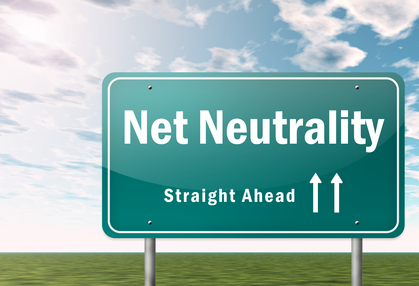
The fact that Barack Obama is the first president in more than half a century to win at least 51% in two campaigns illustrates just how tightly contested and immovable our party affiliations are. Diehard reds and blues are more evenly distributed across the nation than at any time since the late 19th century. America is turning purple.
That’s why swing voters represent a holy grail for modern politicians. They may only account for around 8% of the population but in this political landscape, such margins make for landslide election victories.
Winning over swing voters invariably comes down to judging the public mood on single-issue policies. In next week’s midterms, that issue is undoubtedly net neutrality. For the undecided electorate, a candidate’s stance on net neutrality is make-or-break.
It’s a debate that shouldn’t even be necessary. In 2010, the Federal Communications Commision (FCC) ruled that Comcast, Verizon and other broadband providers had to treat all content equally, be it a YouTube clip or a video posted on a personal blog. That ruling was overturned by Washington’s Court of Appeals in January of this year, and service providers are now free to create tiered pricing arrangements, charging companies like Netflix higher rates for speedier web access. Those costs are inevitably passed on to the consumer, which is why net neutrality should be a no-brainer for political candidates.
And yet politicians from across the spectrum are completely ignoring the zeitgeist, lining up with ISPs to lobby for multi-tiered Internet access. Don’t like that idea? Consider these before voting today:
Party Lines Aren’t Always Straight
If you think all proponents of net neutrality are Democrats and all opponents Republicans, think again. This issue has only become front-page news in the last few months. During the last election cycle it wasn’t expedient for candidates from either side to publicize their position on net neutrality. But that’s politics – you pick the least bad option. That’s precisely what voters in Maryland will have to do this week. In the red corner: Dutch Ruppersberger, the Democratic incumbent seeking reelection. In the blue corner, David Banach, who is nobody’s favorite to win. Banach isn’t exactly flying the flag for a free, open Internet. In fact he’s never mentioned it, unlike Ruppersberger, an ardent advocate for the Cyber Intelligence Sharing and Protection Act (CISPA).
Vote Libertarian in Texas
Texans have a similarly poor choice of candidate. Incumbent John Cornyn has said net neutrality would “impose more regulation on the Internet” while Libertarian Rebecca Paddock has promised “accountable oversight” if elected. There isn’t even a registered Democrat running in the state’s 21st District; Congressman Lamar Smith was the driving force behind the much-derided, controversial SOPA anti-piracy bill of 2011. Young Turk Ryan Shields, running on a Libertarian ticket, would be a better choice for anyone seeking to restore net neutrality.
‘Internet Freedom’ it Ain’t
It’s called net neutrality. Be wary of those advocating for anything else. Rep. Marsha Blackburn has consistently argued the case for the big Internet providers, but always using the language of her opponents. In 2011, Blackburn introduced the ‘Internet Freedom Act’ that was designed to prevent the FCC from mandating ISPs to treat all data equally. She even attempted to block local municipalities from building their own public broadband networks to sell web access directly to citizens.
In Ohio, Rep. Bob Latta has also couched his anti-net neutrality arguments in the language of the classical liberal. His proposal to prevent the FCC from enforcing net neutrality aims – according to him – to “ensure the Internet remains open and free.” If the Daily Dot has it right, Latta’s relationship with at least two major ISPs is worth looking into.
Latta, Blackburn and the rest will always find a choir to preach to. But apart from a handful of big companies (and the usual Tea Bagging suspects who would oppose anything the FCC does on the grounds of its first initial), the vast majority of American citizens want net neutrality. The success or failure of a modern political campaign depends on embracing those values. That’s why in an election year, opposing an open Internet is political suicide.